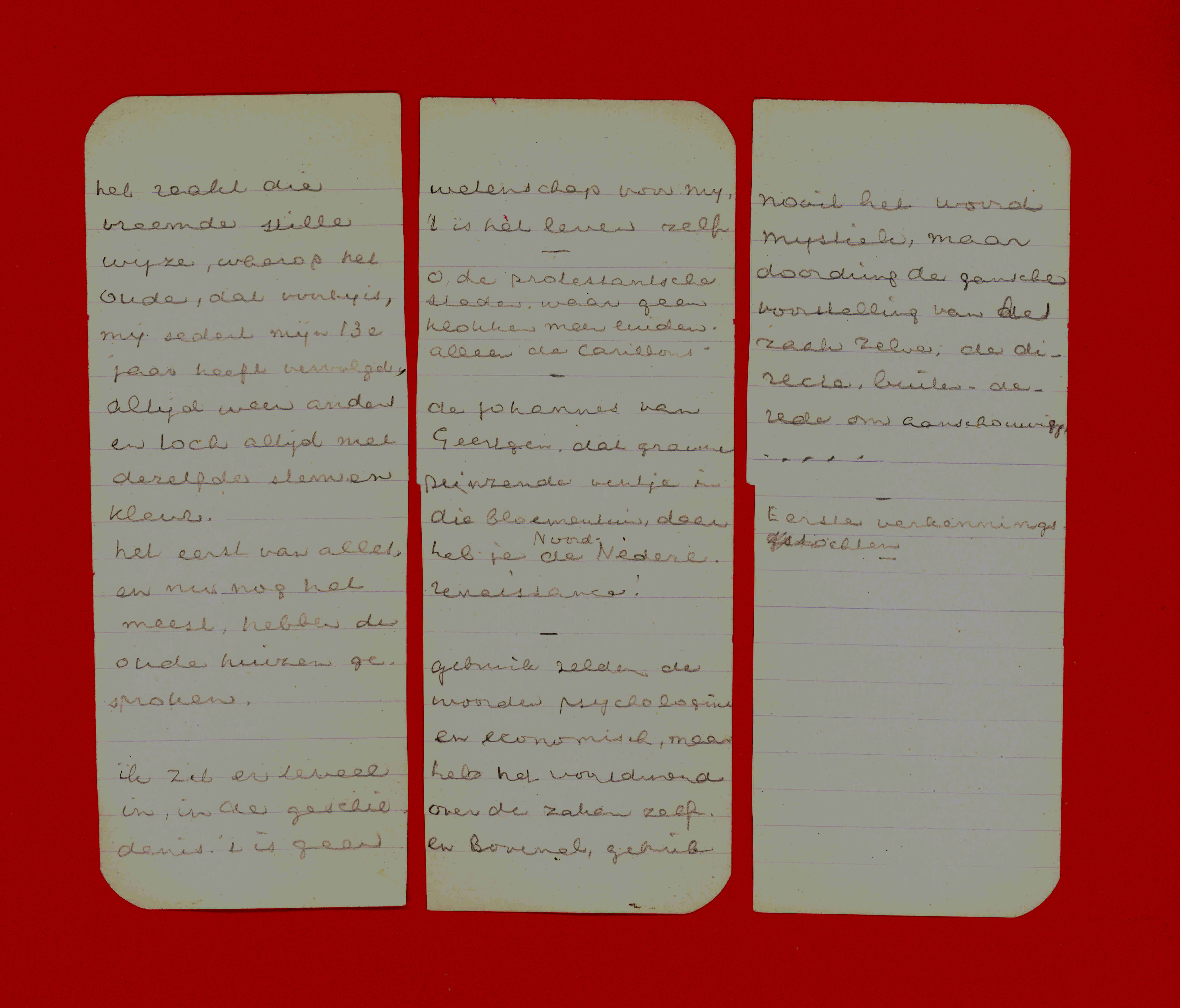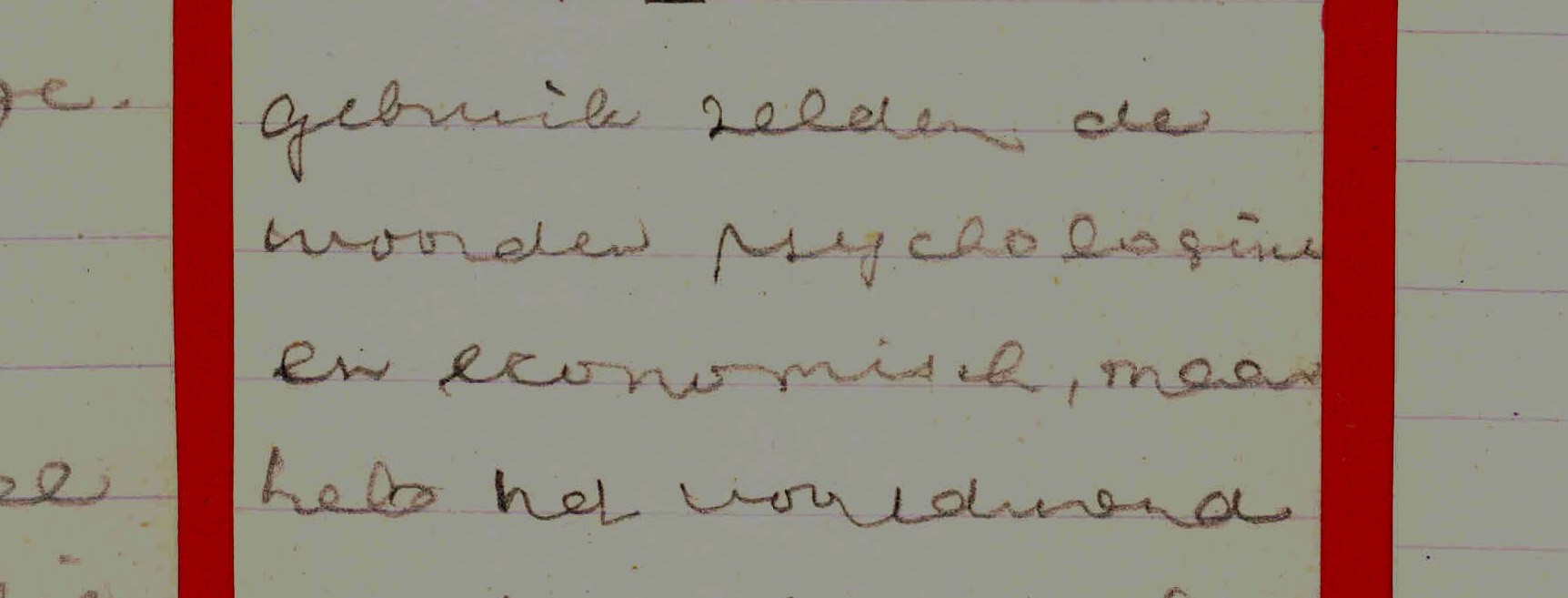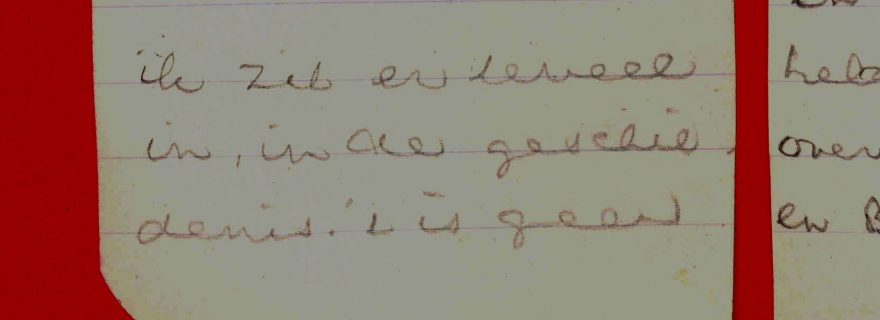Huizinga and the historical sensation
‘I am too much in it, in history. ‘t Is no science for me, it is life itself’
The theme of the dies natalis 2010 of Leiden University is science and emotion. Few scholars will have represented such a just equilibrium between science and emotion as the historian Johan Huizinga (1872-1945). His extensive archives belong to the exquisite treasures of the University Library, counting over 135 boxes, dealing with the most different subjects concerning the history of culture.
To the most spectacular parts of the Huizinga archives belong his notes for a great work he intended to write (ca. 1906-1908) on the cultural history of the Low Countries. It should have been a magisterial treatise on the culture of the Netherlands from the brothers Van Eyck till Rembrandt. Huizinga made numerous remarks, among wise advises to himself. When he had incorporated his notes in his text, he collected them in an envelop, on which he wrote a specific keyword. These envelopes with notes are a treasure for the cultural historian. How attached he felt himself to history, is obvious from various notes in the envelop ‘eenzelvigheid’, ‘introversion’: ‘I am too much in it, in history, it is no science for me, it is life itself’.

Collection Leiden University (HUI 122: 2-2.7)
As is apparent from the adjacent notes and many others, Huizinga felt himself emotionally attracted to history. At the same time he rendered himself account that with emotion alone no writing of history could be achieved. As he hold to himself in another remark: ‘Can you make all these reflections become true? Can you demonstrate them in thousand peculiarities? Because before that, you will not have achieved your task as an historian. It is not the general but the specific we want to know’.
History could fall upon him by reading a document or chronicle, hearing a song, examining a print, looking at an old land- or cityscape. It made him surpass above himself and let him so to say having part on history. Huizinga expressed this with the term ‘historical sensation’. Philistines condemned this approach, but he knew for himself that susceptibility for things past was a pure emotion, leaving reason apart, nothing more, but also nothing less.
This left unimpeded that he remained a strict scholar or scientist in his historical writing… as long as history could be called a science. An historian may be very scholarly, but when he has no eye for the passions in the past, he will badly fulfil his task as an historian. When Huizinga himself as rector of the university hold the annual lecture at the dies natalis of 1933, he choose as his subject: ‘On the boundaries of play and earnestness in culture’. Here he presented for the first time his thesis that every culture, wherever on earth, emerges in the form of play. In his Homo ludens (1938) he elaborated on this bold thesis in every field of live. On few occasions in Leiden such a lucid discourse on science and emotion will have been hold as on that memorable February 8th, 1933.

Transcription of the depicted notes:
- it touches upon the peculiar, silent way in which the old, that has past, has been persecuting me, since my 13th year, time and again in a different manner, but always with the same voice and colour.
- first of all, and now even most, the old houses have spoken.
- I am too much in it, in history, it is no science to me, it is life itself.
- o, the protestant towns, where no bells are ringing, only the chimes.
- saint John by Geertgen [tot Sint-Jans], that grey, pensive figure in that flower-garden, there you have the Northern Netherlandish renaissance!
- use seldom the words psychological and economical, but deal continuously with the objects themselves.
- and above all, never use the word mystical, but imbue the entire representation with the object itself, the direct perception of it, leaving reason aside.
- first explorations.
- understanding just a little bit of the mystical beauty of the quotidian - In our land the Imitatio had to emerge.
- the humanists the first who were haunted by the past. But how different than the past does obsess us.
- the difficulty is that this should become a work of poetry, a piece of myself. Your case is at stake.



